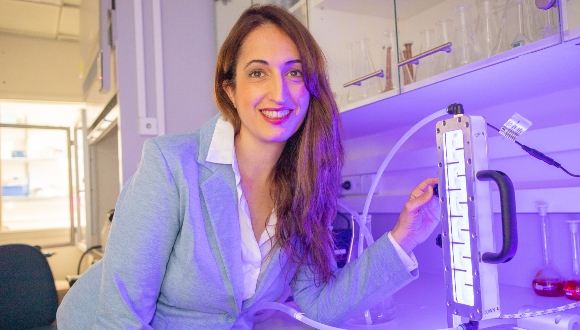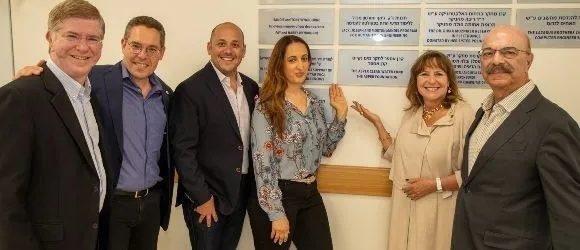Gift enhances partnership between Tel Aviv University and one of Canada’s largest foundation.
Tel Aviv University together with the Canadian Friends of Tel Aviv University (CFTAU) on June 14 inaugurated the Asper Clean Water Fund, established with a $407,000 gift from The Asper Foundation, one of Canada’s largest private foundations. The funds will bolster the work of TAU’s Water Energy (WE) Lab to further develop technology that produces safe drinking water in the developing world.
Headed by Prof. Hadas Mamane of TAU’s Fleischman Faculty of Engineering, the Lab is among numerous research teams devising solutions to address global water scarcity. Her Lab has developed a patented technology that uses LED lighting and solar energy to disinfect water. The laptop-sized device—called SoLED—operates without any chemicals or electricity to kill 99.9% of bacteria and viruses from water, making it cheaper and easier to use than existing solutions in remote areas.
At least 2 billion people around the world use water from contaminated sources. Furthermore, unsafe water is linked to the deaths of an estimated 800 children each day. The issue predominantly affects people in the developing world, where access to clean water resources is often unaffordable or inaccessible. More so, as the impact of climate change increases, water scarcity will affect nearly half the world’s population by 2025, according to expert estimates.
Among attendees at the inauguration ceremony at TAU were Gail Asper, President and Trustee of The Asper Foundation; Moses Levy, Executive Director of The Asper Foundation; TAU Vice President for Resource Development Amos Elad; Dean of the Engineering Faculty Prof. Noam Eliaz; and Prof. Mamane together with researchers from her lab.
“My late parents, Israel and Babs, would be incredibly proud of this endeavor which will make such a positive impact on people’s lives,” said Gail Asper. “The research at Prof. Mamane’s Water-Energy Lab and at Tel Aviv University aligns with our Foundation’s commitment to supporting entrepreneurial spirit and to creating a better world. We are excited to embark on this journey to advance innovative ideas and change lives.”
The support of The Asper Foundation, a leading force in Jewish and general philanthropy in Israel and Canada, will enable Prof. Mamane and her team to further expand the capabilities of the technology and field-test the device. Their ultimate goal is to produce a scalable version that could be manufactured for mass distribution.

Prof. Hadas Mamane, head of Tel Aviv University’s Water Energy (WE) Lab, with the SoLED device. (Credit: Rafael Ben-Menashe/TAU)
The gift enhances the existing partnership of philanthropic support and collaboration between the Asper Family, based in Winnipeg, and the University.
Tel Aviv University President Prof. Ariel Porat said: “As Israel’s largest research university, TAU places great importance on creating solutions to global challenges to the environment and society. We are thrilled to welcome The Asper Foundation as a partner and look forward to working with its team.”
Prof. Mamane, Head of the Water-Energy Lab and Environmental Engineering Program at TAU, explained that her passion for the project stems from her deep-seated desire to help bridge the disparities in affordable clean water access, particularly for vulnerable peoples in rural and low-income communities. Her lab works with interdisciplinary teams from disciplines including Social Sciences, Psychology and Public Policy to determine the most effective ways to incorporate her technology into broader safe water delivery processes.
“My team and I are delighted and honored by The Asper Foundation’s support,” she said. “This gift will accelerate our efforts to provide underserved populations with access to clean water—a basic human right and an endeavor that stands to save thousands of lives.”
Canadian Friends of Tel Aviv University Chief Executive Officer (Ontario & Western Canada) Stephen Adler added: “CFTAU is proud to be a link between the great Canadian family and Israel’s leading research university. We look forward to seeing the fruits of this research and identifying ways to maximize its impact in Israel, Canada and around the world. We thank The Asper Family Foundation and the Asper Family for their continued support and friendship.”
